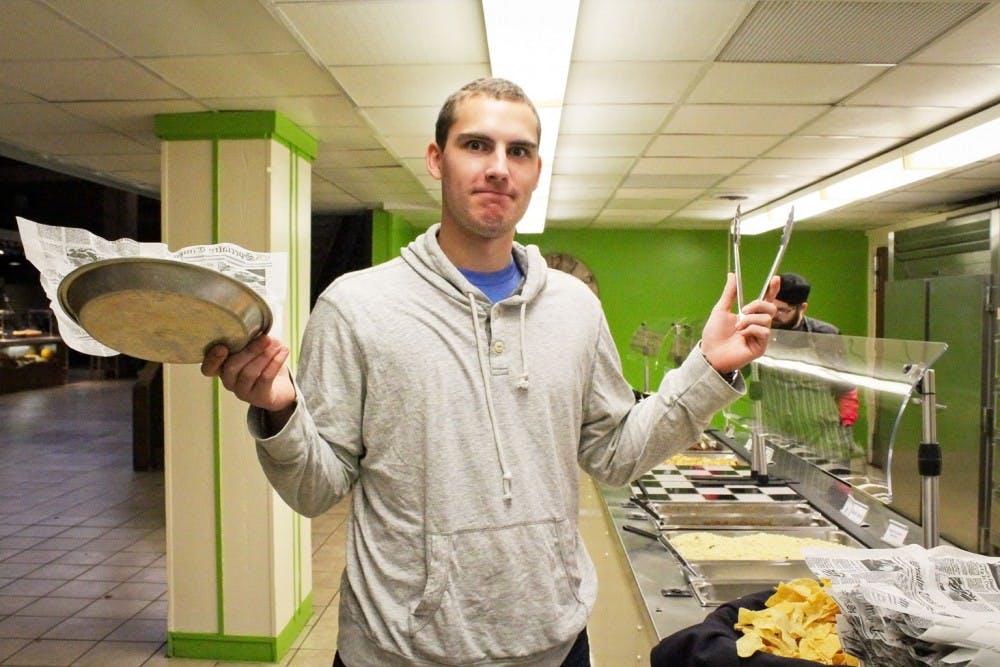By Natalie Nohr | Contributor
In one week alone, DC workers were forced to throw away 22 trays of cookies and 14 trays of bread, according to DC Service Manager Melissa Crouch.
This is because students used their hands instead of the provided utensils. DC employees are required to throw away the trays of food that students touch with their hands.
Section 233 Subsection A of Indiana's Retail Food Establishment Sanitation Requirements states, "A food dispensing utensil shall be available for each container displayed at a consumer self-service unit, such as a buffet or salad bar."
"I don't know how many kids just grab things with their hands," Head Chef Megan Jeffers said. "You want to serve yourselves, but you just don't know how to serve yourselves."
For many, the policy requiring students to use tongs does not make sense.
"I think there are so many germs already on those (desserts); my contribution is null and void," freshman Caleb Knuth said.
Crouch said that the DC staff hopes to prevent the flu and other illnesses from traveling between students. She said their goal is to protect students from contamination.
Taqueria pans are also intended to protect students, particularly those with allergies. Students are asked to use the distinct metal pans instead of other DC dishes to ensure no allergens are introduced to the line.
Director of Dining Services Matthew Riley said the DC staff seeks to do what is best for the student body as a whole. Major food allergens are only found in four items in the Taqueria: the cheese, sour cream, flour tortillas and one of the salsas. The venue is intended to help those with minor food allergies, according to Riley.
Though some students might be frustrated by having to juggle another plate, using the clean Taqueria pans helps prevent allergic reactions.
"Let's say you had a plate of pasta and you wanted to come up and get a taco off of Taqueria," Riley said. "Well, if you take that spoon of meat and touch your pasta, you've now contaminated that (tray of meat)."
Riley said that even if the plate is empty, they ask students to use the provided Taqueria pans for simplicity's sake.
For those in need of allergen-free options, the Taqueria is intended to be a reliable choice, but some students find the line inconvenient.
"(Taqueria is) frustrating because . . . it takes forever and a day for them to do something for you," senior Jacob Wormgoor said.
While some students' allergies require special care and preparation by DC staff, others have to search for their food in the DC by using the allergy labels. According to Riley, allergy intolerances can make finding food difficult.
"They feel like, 'I've got to take more time going through the line to inspect all the labels and so I'm holding other people up.' It's just uncomfortable for them," Riley said.
The Taqueria could be an easy place for those with allergies to find a meal, but this requires every student's cooperation.
Crouch said the staff wants to offer the safest and best possible dining experience to students; even if students are careful in serving themselves, there is still a risk of cross-contamination when using other DC plates.
"Our staff aren't standing there looking at everyone's every move," Riley said. "So if something becomes cross-contaminated . . . what (students with allergies) thought was safe to eat can all of a sudden give them a reaction."
Freshman Sarah Manko, who has celiac disease, said that sometimes she eats the gluten free desserts, but they still make her sick.
However, Manko said the DC staff is willing to help. Special diet cook Paula Hayes prepares food in a different location from the other DC food to avoid cross-contamination.
"I think there's just this general lack of appreciation for what the DC does," Manko said. "(Students) want food now . . . they can be more patient."





